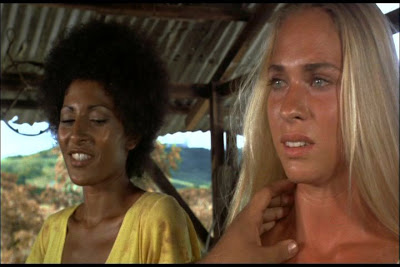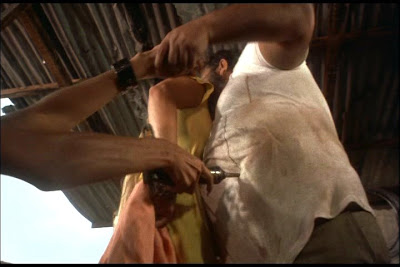
Although usually reviled by both critics and viewers alike, I find that BLACK MAMA, WHITE MAMA, is not only the best film Eddie Romero has ever directed, but also one of my favourite exploitation films of the seventies. In part that is due to the wonderful performances of Pam Grier and Margaret Markov, surprisingly restrained in terms of camp and nudity, but nonetheless pretty rich in warmth and complicity. Add to that some memorable performances from a bevy of supporting actors, from the sexy lesbian couple of guard and warden played with some affection by Lynn Borden and Laurie Burton, campy cowboy bounty hunter Ruben (a wonderful Sid Haig), seedy lowlife drug baron Chen (Vic Diaz) and the surprisingly fit and funny revolutionary leader Ernesto (Zaldy Zschornack), and you’ll get a little gem of a film that will shine through the nooks and crannies of the admittedly scant plot to its bittersweet ending.

Said ending is one of the points of contention among detractors of the movie that think it a denial of everything that happened before; and to some extent it is… but that is life’s way, and although one can not claim that BMWM is a realistic portrayal of life in a female penal colony in some tropical island in the seventies (the movie was lensed in the Philippines), we can not use that fact to deride the few elements of political and social allegory that Jonathan Demme’s script wove all over the fantasy core of the narrative.

And what is the narrative, filled with subplots as it is? Lee Daniels (Pam Grier) and Karen Brent (Margaret Markov), a hooker and a revolutionary, arrive at a female correctional facility run by lesbian warden (Burton) and overseen by her partner Logan (gorgeous actress Lynn Borden), who has the habit of peeping on the prisoners while they shower and to demand sexual favours in exchange for a better treatment. Following a catfight in the prison cantina between Daniels and Brent, both women do a stinch on a hotbox prior to being transferred to a maximum security prison on the city, where they will be interrogated concerning the drug traffic of Daniels’s pimp and the guerrilla’s activity of Brent’s insurrectionist group. Before they get to their destination, the paddy wagon is ambushed by the guerrillas trying to free Brent, and during the ensuing fire-fight both women escape into the jungle, chained to one another, in a clear rehash of THE DEFIANT ONES (Stanley Kramer, 1958).



Although free from the police, they both have distinct agendas: Daniels wants to regain possession of a loot of some 40.000 dollars that she stole from her pimp/boyfriend, and Brent needs to be reunited to her guerrilla companions for she is the only one who can broker a weapons deal that will allow the revolutionaries to fight the corrupt government. That puts them at odds with one another, as they both remain chained to each other and want to follow in different directions. To complicate their difficult and unwanted cooperation, they are being pursued not only by the police, but also by a bounty hunter hired by one of the cops, Cheng’s gang of assassins and Ernesto’s Guerrillas, all of which will have a major showdown on the Fiipino docks in the fiery climactic battle.

Although the heart of the movie resides on the cementing of Grier’s and Markov’s character’s friendship and trust, we feel that they are bound to one another long before they get chained on the paddy wagon. For they are – or seem to be – complete opposites; and as every physics student will tell you, you can’t put two opposites in the same box without them being violently attracted.
The relationship between both women is clearly clichéd, but it is also that relation that justifies the unpopular ending of the film. The mutual despite is obvious from step one, and maybe better voiced when near the end Daniels tells Brent that “I’ve been a revolutionary since I was 13 – the first time I was paid to do it”, hinting that her descent into prostitution was a kind of stance against the system, a means of survival, a strengthner of character. In contrast, Markov’s revolutionary feels more like a pampered rich girl that got bored of having every whim satisfied and wanted to try some action fighting for the poor, something she never was. And the film seems to bear testimony to it.


When we first see Karen Brent on the police wagon that is taking her to prison, she seems more annoyed than frightened or worried with what she was about to experience. She visibly dislikes Daniels that is in the wagon with her, a dislike of which the hooker partakes, eyeing Brent as if she was just a child playing at being a revolutionary with her shiny golden hair, pouty lips and clean battle fatigues. And indeed, despite being a prostitute, Daniels refuses the sexual advances of Logan, asserting her determination to face whatever conditions she would be dealt, but keeping the power to decide what to do, with whom and when. Not so Brent, who easily accepts the unwelcome attention of the guard, as if she is not used to be treated roughly and will do anything in her power not to be hurt. Here it is Daniels who is the revolutionary and Brent the prostitute.



When they fight in the cantina, it is because Daniels shows resentment for Brent surrender before the corruption of the system, and the way Brent deals with it is more akin to a spoilt child than a mature revolutionary. Later on, already chained, when they first fight over which direction to follow – in one of the most erotic bitch slapping contest you can think of (although there is no nudity or clothes-tearing) – Daniels has no trouble in overpowering the weaker girl, showing her totally unfit for guerrilla warfare.





Then, although the plot is to thin to allow room for deep character building, it is during their run from their pursuers that they begin to respect one another, to learn to cooperate and to love each other, a moment of bonding that occurs when Daniels kills Luis (Subas Herrero) when he attempts to rape Brent. If when they escaped the wagon Daniels seems to kill Logan out of pure revenge for the corruption she stands for, and Brent seems more like a unwilling participant, when it comes the time to kill Luis it is for survival, true, but it is also to protect a friend.



And that is why Brent must die. After growing from a pampering rich girl into a true revolutionary, she must die with boots on and a gun in her hand, helping Daniels escape from the killers. Just as had recently happened to Che Guevara - another Ernesto - whose pictures exposed by the CIA made him look Christ-like. It is a shocking and unexpected death, but it is a beautiful death nonetheless. Elegiac, one could say, as it seems fit for a hero – for a revolutionary fighting against the corrupt system that we’ve been shown all over the film, where the girls meet no one that is sympathetic. And it is the expression of pain and loss in Daniels face that most clearly shows us that Brent has grown up to be that hero she used to play at. And no ending could be more fit to this movie.




2 comments:
What a great post. I loved it. I've always liked this movie. Both of the female leads are great. Plus I'll watch anything Pam is great. I enjoyed your write-up and the photos. Cheers!
Thanks Keith. Watching these films one tends to feel agravated with the universe's essential unfairness. Why couldn't Grier and Markov have done a dozen more films together on those wonderful days of freedom and daring?
Darn!
Post a Comment